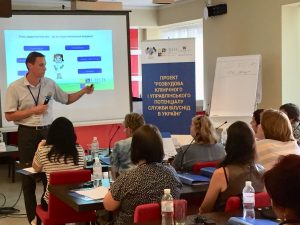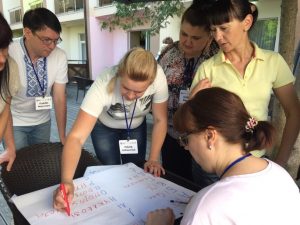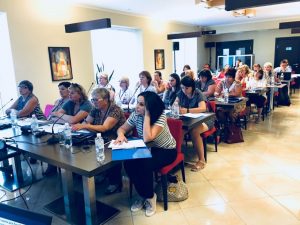Recent public health care reform in Ukraine has called for the growing role of primary health care, task shifting, and decentralization of HIV services while providing care and treatment for people living with HIV (PLWH). In June 2018, the International Training and Education Center for health (I-TECH) Ukraine conducted two back-to-back, five-day in-service training programs on HIV testing services for two cohorts of participants from twelve regions across Ukraine.

The concept and design of these unique pilot training programs were influenced by the recent reform to actively involve general practice/primary care nurses into the process of achieving UNAIDS 90-90-90 targets in Ukraine.
A group of 10 national HIV and health care reform experts, I-TECH’s international consultant-nurse practitioner, and the I-TECH Ukraine training development team carefully designed the learning objectives and content of the training program with consideration of the specifics of the national HIV epidemic, participant backgrounds, as well as anticipated task shifting. Together, these experts synthesized and presented international and national clinical and nursing best practices in the area of serving PLWH.
Training participants included nurses from primary care facilities, specialized HIV clinics, as well as faculty of seven local nursing colleges, including I-TECH Ukraine’s national partners – Ternopil State Medical University and the Nursing College of Poltava Ukrainian Medical and Dental Academy.
The training programs outlined roles for general practice/primary care nurses in achieving UNAIDS 90-90-90 targets, taught HIV basics, helped develop skills for HIV testing services with rapid HIV test kits, and coached participants on conducting counseling for PLWH using a non-discriminatory, patient-centered approach.

Facilitators used interactive training tools and approaches during the program to fully engage participants and strengthen the capacity of the nursing college’s faculty to teach up-to-date HIV content in an appealing and efficient way.
One of the central elements of the program was to educate the participating nurses about the challenges surrounding HIV-related stigma and discrimination with a major goal to overcome it in the nursing community and encourage respectful delivery of services for PLWH.
“[I-TECH Ukraine and its partners are] doing such a[n] important thing,” says Valentyna Borysova, lecturer of Zaporizhzhia Nursing College. “Educating nurses on HIV has been so much underestimated and under-invested in Ukraine.”
In addition to feeling as though this training addressed a critical gap in education, participants also provided positive feedback about the content and facilitation of the training, especially the parts of the training that were facilitated by the international and national peer nurses.

“The knowledge on testing and post-exposure prophylaxis are badly needed at our clinic,” says Liudmyla Samolelis, Senior Nurse of the Psychiatric Clinic in Poltava, Head of Poltava Oblast Nurse Association. “I plan to conduct an on-the-job training for the nurses, using the materials from the training.”
Due to the success of the pilot trainings, I-TECH Ukraine intends to finalize training materials, institutionalize the course through its local partners, and develop a manual that could be used in different training formats, including state-owned colleges and medical universities. In addition, an ambitious regional rollout of the training program is anticipated during the next year of the project.